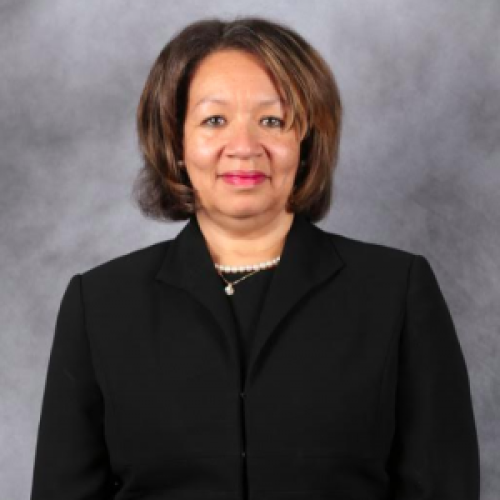Pharmacy
B.S., Pharm.D.
Howard University
1987

Dr. Beverly C. Mims is an associate professor in the Department of Clinical and Administrative Pharmacy Sciences (CAPS) at the Howard University College of Pharmacy (HUCOP) and assistant professor at the Howard University College of Medicine in Washington, DC.
Dr. Mims helped to facilitate the growth and development of clinical pharmacy education at Howard. She served as the course coordinator for Integrated Therapeutics Lab IC, Integrated Therapeutics Lab 2, Integrated Therapeutics Lab 3, Integrated Therapeutics 3B, Therapeutics and Patient Care and Drugs and the Elderly courses. Dr. Mims teaches in other courses within the integrated therapeutics course curriculum. In addition to teaching pharmacy students Dr. Mims teaches medical students assigned to the family and community medicine rotation and has participated in teaching physician assistant students who were enrolled in the clinical pharmacology course. Dr. Mims was introduced to inter-professional education courses when she served as core faculty for the newly created “Health Care Ethics Course: An Interdisciplinary Approach” within the Department of Community Health and Family Practice at the Howard University College of Medicine.
Dr. Mims served in leadership roles as Secretary to the Faculty of the College of Pharmacy, Nursing and Allied Health Sciences, Secretary to the Faculty of the College of Pharmacy, Chair of the College of Pharmacy, Nursing and Allied Health Sciences Faculty Performance Committee, Chair of the Howard University College of Pharmacy CAPS Department Appointment, Reappointment and Tenure Committee, Chair of the CAPS Faculty Search Committee, Chair of the HUCOP Admissions, Recruitment and Retention Committee, and the Chair of the HUCOP Student Grievance Committee. Also, Dr. Mims served as a member of the HUCOP Executive Committee, and CAPS Department Executive Committee. For more than 20 years she served as the campus advisor to the Student National Pharmaceutical Association (SNPhA) Howard University Chapter. The areas of research in which Dr. Mims is interested include behavioral aspects associated with medication use and leadership development.
Through her academic appointment Dr. Mims is assigned to serve as a clinical pharmacist at the Howard University Hospital. In addition, she has work experience as a consultant pharmacist at the Washington Center for Aging Services and as an ambulatory care pharmacist for the Group Health Plan, Humana, and Kaiser-Permanente organizations. Early professional practice experiences included being a staff pharmacist at the District of Columbia General Hospital, and community pharmacist and store manager at the Professional Pharmacy in Washington, D.C. Presently she is a licensed pharmacist in the District of Columbia and the State of Maryland.
For about 20 years Dr. Mims served her community through her active participation offered through mayoral appointment with the District of Columbia Board of Pharmacy. During that time, she served the citizens of the District of Columbia as a board member, secretary and chairperson. Presently, Dr. Mims is a member of two community service organizations in which she is engaged in youth scholarship, leadership, STEM, and arts programs. In addition, she offers and supports community service projects through her membership with her church.
Dr. Beverly C. Mims is a native Washingtonian and earned a Bachelor of Science (B.S.) degree in pharmacy at the Howard University College of Pharmacy. She later returned to alma mater where she earned a Doctor of Pharmacy (Pharm.D.) degree. She is the mother of one son, M. Armwood-Phillips Jackson, Attorney-at-Law.
B.S., Pharm.D.
Howard University
1987
Course Description: Integrated Therapeutics Lab III is a 4-credit course that is offered over a 15- week period. During the Integrated Therapeutics (IT) Lab 3 the student is expected to acquire the knowledge and develop the skills which are required to appropriately provide information to health care providers, advise patients and dispense, prescription and non-prescription, (OTC) medications, complementary and alternative medicines (CAM) and products, medical devices and other health care products employed in the treatment of endocrine, renal, hepatic, gastrointestinal, neurological, psychiatric, respiratory diseases and conditions, and selected women’s and men’s health diseases and conditions. The appropriate selection, rational use, advise to the patient, therapeutic efficacy and issues, warnings, precautions, contraindications, drug interactions, use in pregnancy and lactation of prescription and non-prescription, (OTC), medications, complementary and alternative medicines (CAM), and home and health aids in patients who have the specified diseases or conditions will be studied. Application of the Pharmacists’ Patient Care Process (PPCP) is expected.
The Drugs and the Elderly course is designed to sensitize the student to the special pharmacotherapeutic, physiological, psychological, sociological, and economic aspects of aging. Specific pharmacotherapeutic needs of the elderly will be studied
The internal medicine rotation will provide the student with the opportunity to interact with a general medicine team in an acute care hospital setting. The student will participate in scheduled daily rounding activities, and interact with physicians, medical students, nurses, and patients. The student may be asked to prepare a special topic subject for presentation to the entire medical team. Students will observe the acute health care process from the admission of patients to the medical units until discharge. Students will be responsible for collecting and maintaining appropriate data forms, and for the completion of SOAP notes including a pharmacist’s patient care process plan for each medical problem for each assigned patient. The student will meet with the preceptor at least twice weeklyfor therapeutic conference/case discussions. Students may be expected to attend various hospital meetings including the Pharmacy and Therapeutics Committee meeting. Students may be asked to assist in the completion of special reports as assigned by each hospital committee.